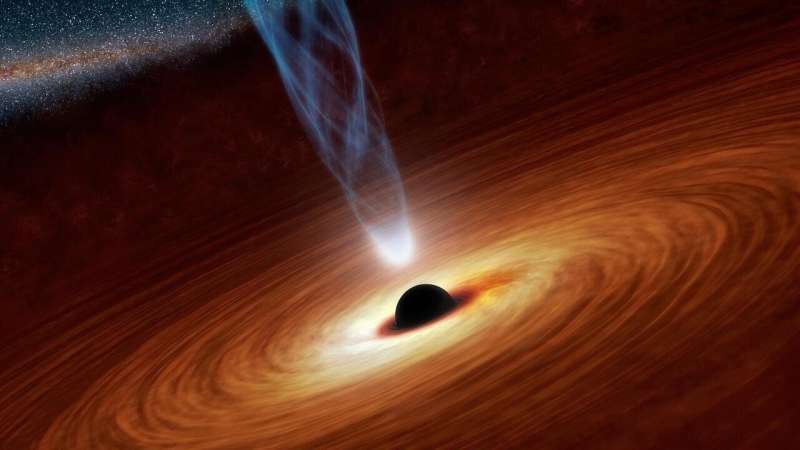
Credit: NASA
For the past seven decades, astrophysicists have theorized the existence of “kugelblitze,” black holes caused by extremely high concentrations of light.
These particular black holes, they speculated, could be related to astronomical phenomena such as dark matter, and have even been suggested as the power source of hypothetical spacecraft engines in the distant future.
However, new theoretical physics research by a team of researchers at the University of Waterloo and the Universidad Complutense de Madrid shows that kugelblitzes are impossible in our current universe. Their research, titled “There are no black holes from light,” is published in arXiv preprint server and is available Physical review papers.
“The best-known black holes are those caused by large concentrations of regular matter collapsing under its own gravity,” said Eduardo Martín-Martínez, who is a professor of applied mathematics and mathematical physics and a Perimetric Institute Fellow for Theoretical Physics.
“Because, in Einstein’s theory of general relativity, any kind of energy bends space-time, it has long been speculated that a large concentration of energy in the form of light could lead to a similar collapse. However, this prediction was did without considering quantum effects.”
The team built a mathematical model, taking into account quantum effects, which showed that the concentration of light required to create kugelblitzes would be tens of orders of magnitude greater than that observed in quasars, the brightest objects in our universe.
“Long before you reach that light intensity, some quantum effects would occur first,” said José Polo-Gómez, a Ph.D. candidate in applied mathematics and quantum information. “The strong concentration of light would lead to the spontaneous creation of particles like electron-positron pairs, which would very quickly leave the area.”
Although the conditions necessary to achieve such an effect are impossible to test on the ground using current technology, the team can be confident in the accuracy of their predictions because they rely on the same mathematical and scientific principles that positron emission tomography (PET) scans.
“One way to understand this phenomenon is to think of the annihilation of matter and antimatter, like what happens during PET scans. Electrons and their antiparticles (positrons) can annihilate each other and decay into pairs of photons, or ‘particles. ‘ easy,” Martín-Martínez said.
“Our results are a consequence of phenomena called ‘vacuum polarization’ and the Schwinger effect, and while explaining them in a nutshell can be challenging, a useful way to think about it is this: The phenomenon we predicted would The creation of black holes by light is in many ways the opposite of the matter-antimatter decay phenomenon that occurs in a PET scan. When there is a large concentration of photons, they can decay into electron-positron pairs, which dissipate quickly, taking the energy with them and preventing gravitational collapse”.
While the impossibility of the kugelblitz may be disappointing to astrophysicists, the discovery is an important breakthrough in the kind of fundamental physics research made possible by the partnership between Applied Mathematics, the Perimeter Institute and the Institute for Quantum Computing at Waterloo.
“While these discoveries may not have known applications now, we are laying the foundations for the technological innovations of our successors,” said Polo-Gómez. “The science behind PET scan machines used to be so theoretical, and now there’s one in every hospital.”
More information:
Álvaro Álvarez-Domínguez et al, There are no black holes from light, arXiv (2024). DOI: 10.48550/arxiv.2405.02389
Provided by the University of Waterloo
citation: Quantum effects stop black hole formation from high concentrations of intense light, physicists say (2024, June 24) Retrieved June 24, 2024 from https://phys.org/news/2024-06-quantum-effects- formation-black-hole.html
This document is subject to copyright. Except for any fair agreement for study or private research purposes, no part may be reproduced without written permission. The content is provided for informational purposes only.
#Quantum #effects #stop #black #holes #forming #high #concentrations #intense #light #physicists
Image Source : phys.org